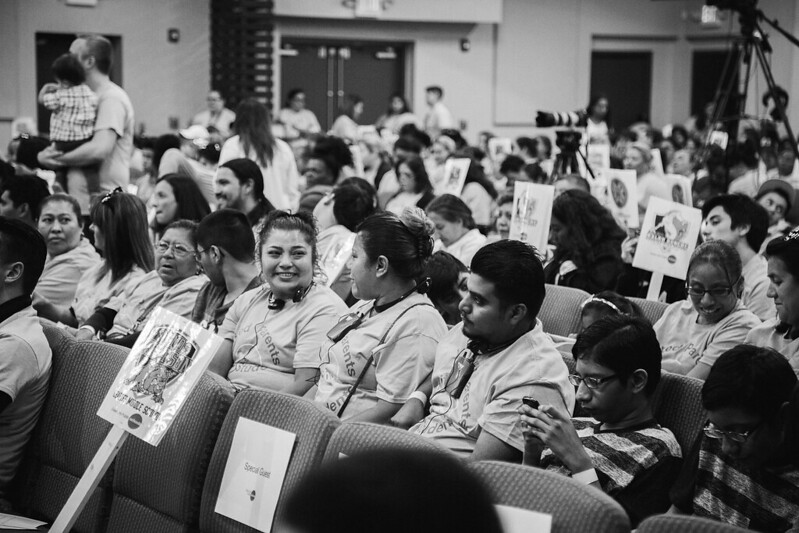Organizing is the road toward prosperity, says United Parents and Students

Broad-based Organizing is the best way to fight inequality and improve conditions in our communities, according to United Parents and Students executive director Larry Fondation.
In materials prepared by Fondation, he outlines how communities should work together identifying the issues that affect them directly, such as crime, food deserts, low wages, and long hours, as well as the quality of education.
Fondation pointed out that UPAS, which serves Green Dot communities in California and Tennessee, is continuing its quest to support the areas served by our schools by empowering residents through access to multiple kinds of capital, not necessarily financial. That way, he wrote, they will be able to present their problems to elected officials and demand solutions.
The Five Types of Capital are Human, Social, Political, Intellectual and Financial. All of them are necessary to solve the common problems communities face: crime, illegal dumping of trash in the neighborhoods, and inadequate job opportunities, among others.
“United Parents is trying to reweave the social fabric in the communities we serve. We conduct much of our work, and have focused most of our issues, with the five capitals in mind,” explains Fondation. “Accordingly, throughout our regions, we have brought together elected officials, appointed officials, law enforcement, community-based organizations, and the private sector to help us solve the vexing problems too many of our families face.”
Fondation defines the five types of capital as follows:
- The development of Human Capital is an investment in the capacity and talents of individuals. It entails systematic education and skill development (in adults, for purposes of this discussion). “It would include adult literacy, teaching English as a Second Language (ESL), and job training, among other programs.”
- Social Capital, which means simply the social “glue,” are the ties of neighborhood and community. “We can see the fact that joining and being regularly involved in organized groups has a very significant impact on society. Interaction enables people to build communities, to commit themselves to each other, and to knit the social fabric.”
- Political Capital is the ability to act in concert for the good of the whole. “It is often in short supply in distressed areas, but that must change.”
- Intellectual Capital is harnessed brainpower. “Many people in the United States and abroad are paid to think. Very few, however, are paid to think about, with and for the communities we serve. Our families do not have lobbyists, spin doctors, or endowed University chairs. What is needed is a concerted effort to link up the resources of schools, universities, and think tanks and to develop pragmatic ideas which marry such intellectual resources to the creative spirit and entrepreneurial energies of low-income neighborhoods.”
- Financial Capital, not defined as hand-outs or government programs although both may be necessary at times. “In a given community, money takes on two primary forms for social purposes – investments made, and credits extended. The status of these two sides of the coin is woeful in most neighborhoods where UPAS organizes. To strengthen families, we must explore opportunities for job creation and wealth creation.
“No single form of capital can be dominant; unrestrained by the others, each can create its own types of imbalances, and concomitant problems. Conversely, none can be absent either,” adds Fondation. “The five capitals are to a healthy human community what vital organs are to a healthy human body – both completely necessary and necessarily in balance.”
Fondation lays out that the core work of UPAS and community organizers is teaching low-income families how to be a voice in the public area. That way, communities are empowered to make public officials take actions to solve the problems that affect them.
“At United Parents and Students, we believe in doing; we believe in action. By educating and organizing our parents, and our neighbors, we are creating the space and the capacity to address our central problem – a lack of power. By building UPAS, we are creating an organization to give parents, students, and families a place to learn and a place to raise our collective voice,” adds Fondation. (no “U”)
UPAS believes that communities can’t just organize when electoral events occur, as the solution will be short term. To create change in the long run, organizing and voicing their issues must be a year-round task.
“For most of us, to realize our hopes and dreams for the improvement of our country we rely on century old tactics of winning electoral victories at the ballot box and the organizing and mobilization of people. However, what has become clear to me is that folks have begun to organize every 2, 4, or 6 years,” said Foundation. “Ad hoc organizing is not the path to social change. It never has been. The path to power– — like the building of a great Cathedral, a splendid mosque, or a sacred and historic synagogue — — is a long-term, continuous grind of developing organizations that work not every few years, but 365 days a year, year after year, decade after decade.”
In his document, Fondation describes what UPAS believes is the solution to start the road to alleviate inequality, which is the root of the issues that affect our communities. Guaranteed Basic Income and adjusting the minimum wage to $20 an hour would be the first steps in that direction, but to make this happen, we must organize.
“UPAS believes that fundamental change is necessary to truly alleviate poverty and its effects. A large, organized base is the necessary tool to fight and win,” said Foundation. “People want to be their own self-advocates. The skills of public life can be taught. A powerful base precedes policy or program. Broad-based organizing can do that.”
